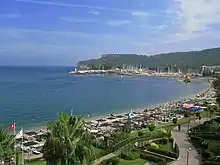Portal:Turkey
Merhaba! Welcome to the Turkey portal
 Flag of Turkey | |
.svg.png.webp) | |
Turkey (Turkish: Türkiye Turkish pronunciation: [ˈtyɾcije]), officially the Republic of Türkiye (Turkish: Türkiye Cumhuriyeti [ˈtyɾcije dʒumˈhuːɾijeti] (![]() listen)), is a transcontinental country located mainly on the Anatolian Peninsula in Western Asia, with a small portion on the Balkan Peninsula in Southeast Europe. It borders the Black Sea to the north; Georgia to the northeast; Armenia, Azerbaijan, and Iran to the east; Iraq to the southeast; Syria and the Mediterranean Sea to the south; the Aegean Sea to the west; and Greece and Bulgaria to the northwest. Cyprus is off the south coast. Most of the country's citizens are ethnic Turks, while Kurds are the largest ethnic minority. Ankara is Turkey's capital and second-largest city; Istanbul is its largest city and main financial centre.
listen)), is a transcontinental country located mainly on the Anatolian Peninsula in Western Asia, with a small portion on the Balkan Peninsula in Southeast Europe. It borders the Black Sea to the north; Georgia to the northeast; Armenia, Azerbaijan, and Iran to the east; Iraq to the southeast; Syria and the Mediterranean Sea to the south; the Aegean Sea to the west; and Greece and Bulgaria to the northwest. Cyprus is off the south coast. Most of the country's citizens are ethnic Turks, while Kurds are the largest ethnic minority. Ankara is Turkey's capital and second-largest city; Istanbul is its largest city and main financial centre.
One of the world's earliest permanently settled regions, present-day Turkey was home to important Neolithic sites like Göbekli Tepe, and was inhabited by ancient civilizations including the Hattians, Hittites, Anatolian peoples, Mycenaean Greeks, Persians, and others.
Following the conquests of Alexander the Great which started the Hellenistic period, most of the ancient regions were culturally Hellenized, and this continued during the Byzantine era. The Seljuk Turks began migrating to Anatolia in the 11th century, which started the Turkification process. The Seljuk Sultanate of Rum ruled Anatolia until the Mongol invasion in 1243, when it disintegrated into small Turkish principalities. Beginning in the late 13th century, the Ottomans united the principalities and conquered the Balkans, while the Turkification of Anatolia further progressed during the Ottoman period. After Mehmed II conquered Constantinople (now Istanbul) in 1453, Ottoman expansion continued under Selim I. During the reign of Suleiman the Magnificent, the Ottoman Empire became a global power.
From the late 18th century onwards, the empire's power declined with a gradual loss of territories. Mahmud II started a period of modernization in the early 19th century. The Young Turk Revolution of 1908 restricted the authority of the Sultan and restored the Ottoman Parliament after a 30-year suspension, ushering the empire into a multi-party period. The Three Pashas took control with the 1913 coup d'état, and the Ottoman Empire entered World War I as one of the Central Powers in 1914. During the war, the Ottoman government committed genocides against its Armenian, Greek and Assyrian subjects. After its defeat in the war, the Ottoman Empire was partitioned.
The Turkish War of Independence against the occupying Allied Powers resulted in the abolition of the Sultanate on 1 November 1922, the signing of the Treaty of Lausanne (which superseded the Treaty of Sèvres) on 24 July 1923 and the proclamation of the Republic on 29 October 1923. With the reforms initiated by the country's first president, Mustafa Kemal Atatürk, Turkey became a secular, unitary and parliamentary republic. Turkey remained neutral during most of World War II, but entered the closing stages of the war on the side of the Allies.
Turkey played a prominent role in the Korean War and joined NATO in 1952. During the Cold War years, the country endured two military coups in 1960 and 1980, and a period of economic and political turmoil in the 1970s. The economy was liberalized in the 1980s, leading to stronger economic growth and political stability. Since 2002, the country's political system has been dominated by the AKP and its leader Recep Tayyip Erdoğan, under whom a decade of rapid growth in nominal GDP took place until 2013, which was followed by a period of recession and stagnation in terms of USD-based nominal GDP between 2013 and 2020, and high inflation as of 2023. The AKP government's initial economic achievements, which were financed through privatization revenues and loans, were overshadowed by democratic backsliding and an erosion in the separation of powers and civil liberties, which gained momentum after the parliamentary republic was replaced by an executive presidential system with a referendum in 2017.
Turkey is a regional power with a geopolitically significant strategic location. The economy of Turkey, which is a founding member of the OECD and G20, is classified among the E7, EAGLEs and NICs, and currently ranks twentieth-largest in the world by nominal GDP and eleventh-largest by PPP. Turkey is a charter member of the United Nations, the IMF and the World Bank; a founding member of the OSCE, OIC, BSEC, ECO, MIKTA, TURKSOY and OTS; and an early member of NATO. After becoming one of the early members of the Council of Europe in 1950, Turkey became an associate member of the EEC in 1963, joined the EU Customs Union in 1995, and started accession negotiations with the European Union in 2005. Turkey has a rich cultural legacy shaped by centuries of history and the influence of the various peoples that have inhabited its territory over several millennia; it is home to 19 UNESCO World Heritage Sites and is among the most visited countries in the world. (Full article...)
Selected article -
 Map of Antioch in Roman and early Byzantine times |
Antioch on the Orontes (/ˈænti.ɒk/; Greek: Ἀντιόχεια ἡ ἐπὶ Ὀρόντου, Antiókheia hē epì Oróntou, Learned Koine Greek pronunciation: [anti.ó.kʰeː.a hɛː e.pí orón.tuː]) was a Hellenistic city founded by Seleucus I Nicator in 300 BC. The city served as the capital of the Seleucid Empire and later as regional capital to both the Roman and Byzantine Empire. During the Crusades, Antioch served as the capital of the Principality of Antioch, one of four Crusader states that were founded in the Levant. Its inhabitants were known as Antiochenes. The modern city of Antakya, in Hatay Province of Turkey, was named after the ancient city, which lies in ruins on the Orontes River and did not overlap in habitation with the modern city.
Antioch was founded near the end of the fourth century BC by Seleucus I Nicator, one of Alexander the Great's generals, as one of the four cities of the Seleucis of Syria. The city's location offered geographical, military, and economic benefits to its occupants; Antioch was heavily involved in the spice trade and lay within easy reach of the Silk Road and the Royal Road. During the late Hellenistic period and Middle Roman Empire, Antioch's population may have reached a peak of over 500,000 inhabitants (most generally estimate between 200,000 and 250,000), making the city the third largest in the Empire after Rome and Alexandria and one of the most important cities in the eastern Mediterranean. The city was the capital of the Seleucid Empire from 240 BC until 63 BC, when the Romans took control, making it capital of the province of Syria and later of Coele Syria. From the early fourth century, Antioch was the seat of the Count of the Orient, head of the Diocese of the East. The Romans provided the city with walls that covered almost 450 hectares (1,100 acres), of which one quarter was mountain, leaving 300 ha (750 acres) – about one-fifth the area of Rome within the Aurelian Walls. (Full article...)General images
Did you know -
- ... that the sports hall of Europe's largest prison complex in Istanbul was converted into a courtroom because the existing one was not big enough to accommodate the hearings of the Ergenekon trial? (February 11, 2010)
- ... that Turkish swimmer Derya Büyükuncu is participating at the Summer Olympics for the sixth consecutive time? (July 30, 2012)
- ... that the Monument of Liberty in Istanbul, the gathering place for the second rally of the Republic Protests, is a memorial for the 31 March Incident that took place in 1909? (May 4, 2007) Wikipedia:Recent additions 139
- ... that the 1955 novel Teneke by Turkish author Yaşar Kemal was adapted into an Italian opera of the same title by Fabio Vacchi in 2007? (October 8, 2007) Wikipedia:Recent additions 175
- ... that Turkish female aviator Nezihe Viranyalı was educated in civil aviation at the University of Tennessee following an invitation by the renowned American pilot Jacqueline Cochran? (January 2, 2009) Wikipedia:Recent additions 238
- ... that Mustafa Kemal Atatürk's state funeral took place twice, once immediately after his death in 1938 and then again in 1953? (May 1, 2011)
- ... that the Shrapnel Valley Cemetery at Gallipoli is named after the distinctive sound produced by shrapnel in the area? (October 13, 2007)
Selected picture
Selected biography -
 İnönü in 1938 |
Mustafa İsmet İnönü (Turkish pronunciation: [isˈmet ˈinœny]; 24 September 1884 – 25 December 1973) was a Turkish army officer and statesman who served as the second president of Turkey from 11 November 1938 to 22 May 1950, and its prime minister three times: from 1923 to 1924, 1925 to 1937, and 1961 to 1965.
İnönü is acknowledged by many as Mustafa Kemal Atatürk's right-hand man, with their friendship going back to the Gallipoli campaign. In the Greco-Turkish War of 1919–1922, he served as the first chief of the general staff from 1922 to 1924 for the regular Turkish army, during which he commanded the forces of the battles of First and Second İnönü. Mustafa Kemal bestowed İsmet with the surname İnönü, where the battles took place, when the 1934 Surname Law was adopted. He was also chief negotiator in the Mudanya and Lausanne conferences for the Ankara government, successfully negotiating away the Sevre treaty for the Treaty of Lausanne. As his prime minister for most of his presidency İnönü executed many of Atatürk's modernizing and nationalist reforms. İnönü gave the orders to carry out the Zilan Massacre. (Full article...)Selected video -
Selected quote -
| “ | A satiated man doesn't know what's hunger, a healthy man doesn't know what's disease. | ” |
Recognized content
Provinces
Topics
Categories
Related portals
WikiProjects
- European Union WikiProject
- Ottoman military history WikiProject
- Greek and Turkish wikipedians cooperation board
- European history WikiProject
- Eastern Europe WikiProject · Caucasia WikiProject
- Balkan military history WikiProject
- Islam WikiProject
- Countries WikiProject · Western Asia WikiProject
- Ancient Near East WikiProject
- Geography WikiProject
Turkish wikipedia
 |
There is a Turkish version of Wikipedia, the free encyclopedia. |
Wikimedia
The following Wikimedia Foundation sister projects provide more on this subject:
-
 Commons
Commons
Free media repository -
 Wikibooks
Wikibooks
Free textbooks and manuals -
 Wikidata
Wikidata
Free knowledge base -
 Wikinews
Wikinews
Free-content news -
 Wikiquote
Wikiquote
Collection of quotations -
 Wikisource
Wikisource
Free-content library -
 Wikiversity
Wikiversity
Free learning tools -
 Wikivoyage
Wikivoyage
Free travel guide -
 Wiktionary
Wiktionary
Dictionary and thesaurus
-
 List of all portalsList of all portals
List of all portalsList of all portals -
 The arts portal
The arts portal -
 Biography portal
Biography portal -
 Current events portal
Current events portal -
 Geography portal
Geography portal -
 History portal
History portal -
 Mathematics portal
Mathematics portal -
 Science portal
Science portal -
 Society portal
Society portal -
 Technology portal
Technology portal -
 Random portalRandom portal
Random portalRandom portal -
 WikiProject PortalsWikiProject Portals
WikiProject PortalsWikiProject Portals









.jpg.webp)






.jpg.webp)


































.jpg.webp)
.jpg.webp)
















.jpg.webp)











